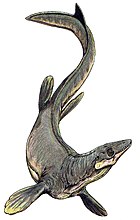Latoplatecarpus
| Latoplatecarpus Temporal range: Late Cretaceous,
| |
|---|---|

| |
| Restoration | |
| Scientific classification | |
| Domain: | Eukaryota |
| Kingdom: | Animalia |
| Phylum: | Chordata |
| Class: | Reptilia |
| Order: | Squamata |
| Clade: | †Mosasauria |
| Superfamily: | †Mosasauroidea |
| Family: | †Mosasauridae |
| Clade: | †Russellosaurina |
| Tribe: | †Plioplatecarpini |
| Genus: | †Latoplatecarpus Konishi & Caldwell, 2011 |
| Species | |
| |
Latoplatecarpus is an extinct genus of plioplatecarpine mosasaur known from the Late Cretaceous (early middle Campanian stage) of the northern Gulf of Mexico and the Western Interior Basin of North America. It was among the largest plioplatecarpine mosasaur, with L. nichollsae measuring over 8 metres (26 ft) in total body length.[1]
Discovery[edit]

Latoplatecarpus was named by Takuya Konishi and Michael W. Caldwell in 2011 and the type species is Latoplatecarpus willistoni. L. willistoni is known from the holotype TMP 84.162.01, a nearly complete skull, including the mandible and dentary, and a partial postcranial skeleton. The holotype was collected in the Pembina Mountain, in southern Manitoba, from the Pembina Member of the Pierre Shale, dating to the early middle Campanian stage of the Late Cretaceous period, about 80.5 million years ago. Three specimens are also referred to this species, including DMNH 8769 (a very well preserved cranial and postcranial skeleton), SDSMT 30139 and AMNH 2182.[1]
Konishi and Caldwell reassigned a second species, L. nichollsae, to this genus from Plioplatecarpus.[2] A new phylogenetic analysis performed by them failed to recover the monophyly of the genus, however it found the North American referred material (e.g. FMNHPR 465, FMNHPR 467 and GSATC 220) of the dubious Platecarpus somenensis to nest within L. nichollsae. The same conclusion has been made based on the ontogenetic, biostratigraphic, and paleobiogeographic data and interpretations.[1]
References[edit]
- ^ a b c Konishi, Takuya; Michael W. Caldwell (2011). "Two new plioplatecarpine (Squamata, Mosasauridae) genera from the Upper Cretaceous of North America, and a global phylogenetic analysis of plioplatecarpines". Journal of Vertebrate Paleontology. 31 (4): 754–783. doi:10.1080/02724634.2011.579023. S2CID 85972311.
- ^ Cuthbertson, R.S.; Mallon, J.C.; Campione, N.E.; Holmes, R.B. (2007). "A new species of mosasaur (Squamata: Mosasauridae) from the Pierre Shale (lower Campanian) of Manitoba" (PDF). Canadian Journal of Earth Sciences. 44 (5): 593–606. Bibcode:2007CaJES..44..593C. doi:10.1139/e07-006. Archived from the original (PDF) on 2011-04-09.

